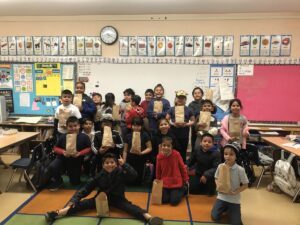 Medical STEM Program: New decade, new curriculum and new touch to cancer education
Medical STEM Program: New decade, new curriculum and new touch to cancer education
Originally Published April 2, 2020
Spring 2020 has seen the successful implementation of the Medical STEM Program (MSP) for three semesters. The USC Norris Comprehensive Cancer Center has been the pillar of financial support and helped to both implement and expand MSP tremendously. It all started in the spring of 2018 as a component of the USC ReadersPLUS’ after-school Wonderkids program. In the Spring 2019 it expanded to a regular school day program, tailored to second graders. Having a more focused program has enabled us to teach cancer education in a much more effective manner. We were able to plan the year’s curriculum with a more cohesive set of lessons that gave continuity and context to teaching the science of cancer.
This semester, the program has also progressed from providing students with background information on cancer to teaching them about skills and fields associated with cancer biology. Curriculum designers, Dieuwertje Kast and Surbhi Bansil, wrote the four units scheduled for teaching this semester. The topics included Laboratory Science, Dermatology, Pharmacology and Pulmonology. Each unit was associated with innovative pre and post assessment tests designed by Stephanie Davis, who is also a Teaching assistant (TA) with MSP. These assessments have been a great resource to track student learning.
The first unit presented this year was laboratory science. A big part of being a cancer researcher is spending a considerable amount of time in a scientific laboratory and performing experiments. Hence, lessons in this unit covered topics like measuring liquid volume, measuring mass, microscopy (the most loved equipment), and the use of microscopes during a lesson on colony counting. The students used sprinkles (representing bacterial cells) to form colonies on glue (the growth media).
The second unit –dermatology– introduced students to the biology of human skin and what happens when this organ becomes cancerous. Through this unit we taught lessons on healthy versus unhealthy cells, skin injuries, effects of UV radiation and skin cancer. Students learned how skin forms a protective barrier that serves to “waterproof,” cushion and protect the deeper tissues, excretes waste, regulates temperature, and serves as the attachment site for nerves of sensory receptors. This is needed to detect pain, sensation, pressure, and temperature. We should all have so much appreciation for our skin!!
The pharmacology unit focused on teaching students about chemotherapy: the most common form of cancer treatment that involves prescription drugs that are given to cancer patients. Lessons were designed to teach second graders about prescriptions, including concepts relating to dosage, active ingredients and frequency. The next set of lessons included the creation of a first aid kit and gigantic prescription bottle costumes. At the end of the activity, students understood that prescription medicines should only be taken by the person whose name is imprinted on the prescription bottles.
The Pulmonology unit was slated to start mid-March, which was the week that the University started putting in proactive preventive protocols to combat the COVID-19 pandemic. MSP had to cancel its last unit and unfortunately the scientists speaking engagements were also cancelled due to COVID-19. As university’s teaching goes virtual, MSP has invested its remote work time in digitizing and filming all of the past MSP lessons to make them accessible to students in need.
MSP has been lucky to have an excited, motivated and innovative group of TAs :Yvonne Hernandez, Eduardo Lopez, Stephanie Davis, Angelina Crittenden and Haig Manoukian (lovely new addition to the team). They have been amused by all the preconceived notions of students about the discussed topics. For example, in the pre-test, some students associated volume with the television volume. In addition, a lot of students associated the idea of mass with what happens on Sundays in church.
A big thank you to Ms. Robles, Mr. Ramirez, Mr. Nakama, Ms. Finnon and Dr. Lopez at Vermont Avenue Elementary, Lenicia B. Weemes Elementary School and Dr. Theodore T. Alexander Science Center School for helping in the ongoing implementation and increasing the effectiveness of MSP in their classrooms.